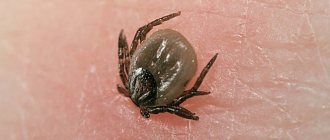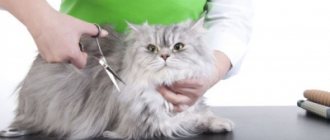A kitten picked up on the street is a small, vulnerable creature that requires care and attention. It is not enough to simply feed and water the baby. You need to arrange a sleeping place, buy a litter tray and other accessories. The kitten needs to be shown to a doctor, worms and fleas removed, and vaccinated. Which of these actions should be done first, and which can wait, we will now tell you.
Does a kitten need veterinary help?
Take the kitten to the doctor as soon as it arrives with you. If this is not possible, a visit to the veterinarian can be postponed if the kitten from the street behaves normally, eats well, has shiny fur, and there is no diarrhea or vomiting.
When to contact a veterinarian
- Wounds on the animal's body (for example, the pet has clearly been in the teeth of dogs). The veterinarian will examine the baby in case of fractures, clean the wounds, and give an injection to prevent blood poisoning.
- Bald patches on the skin can indicate either a skin infection, poor nutrition, or allergies. If you discover baldness in an outdoor cat, increase isolation, care for your pet only with gloves, otherwise you may contract a dangerous disease (ringworm, fungus). The doctor will tell you the exact cause of the receding hairline after scraping.
- The pet is lethargic, refuses to eat, diarrhea, and has blood in the stool. These are symptoms of a dangerous infection. The faster he receives veterinary care, the higher the kitten's chances of survival.
Feed carefully
An outdoor cat, and especially a kitten, needs special food. Their stomach is weakened from malnutrition and bad food, from parasites.
The easiest way to feed food is for small kittens. This is a balanced diet with precise dosage. Low-fat cream, cottage cheese, fermented baked milk are suitable. Do not feed your cat table food or canned fish. A cat accustomed to starving will eat everything that is given to him, but then problems will begin: constipation, diarrhea, vomiting, loss of appetite. It is best if the diet is prescribed by a doctor.
What not to give to cats
What to do with a street kitten first
What to do with a kitten taken from the street depends on its condition. When you are sick, see a doctor. If the baby looks healthy, before feeding, you need to assess the age of the animal:
- A newborn kitten is blind, its ears are drooping, and it cannot walk. If the birth was recent, there are traces of the umbilical cord on the belly.
- A baby at the age of 1-2 weeks weighs 200-300 g. He already opens his eyes slightly, his ears begin to rise slightly, he can move them.
- A pet at the age of 3 weeks weighs from 200 to 400 g. His blue eyes are already open, he can take the first careful steps, reacts to sounds and movement.
- A baby from 4 to 5 weeks weighs from 200 to 500 g. He already runs, plays, eats wet food, his eyes change color.
Kitten (puppy) on the street: pity or danger?
The possibility of encountering diseases that are identical for animals and humans (zooanthroponoses) always exists. The exception is if a domestic kitten (puppy) has just found its way onto the street, either by accident or this is a deliberate “action” of the breeder, who believes that it will be easier to place a litter in such a cruel way. Many of the “fertilizers” don’t think about anything at all, acting on the principle of “out of sight.”
Therefore, veterinarians at the RosVet VC advise immediately taking the foundling to the clinic to identify existing pathologies or make sure that they are absent.
It is ideal if the baby is transported in a carrier bag, any container that prevents close contact with a person. The same spores of dermatomycosis (dermatophytosis, ringworm) perfectly adapt to human hands and clothing and then move to other animals or remain on the owner. This does not mean that you need to shy away from a kitten (puppy) - basic rules of hygiene and quarantine will reduce the risk of getting sick by 99.9%.
It is important to understand! A person who finds an animal on the street will have to pay for examination, treatment, surgery or hospitalization. A veterinarian may not take money for his work, feeling sorry for the kids, but demand that he pay for the cost of medicines, consumables, anesthesia, etc. – illogical.
Therefore, when picking up a kitten on the street, be prepared for expenses. But is it really that important if a small life is saved?
What to feed a stray cat from the street
If the baby is not a month old, you need to:
- Finding a nursing cat is ideal. To do this, write an ad in a local group for cats on VK, FB or another social network. It is unlikely that they will give you a pet, but they may agree to shelter a kitten for a while. Promise to pick up the baby as soon as the need for milk disappears. You may have to pay.
- Buy special food for newborn kittens. It is sold in a veterinary pharmacy.
- Mix 2 tbsp. milk (preferably goat) with 2 raw yolks. Use this option as a last resort, since milk can cause diarrhea and eggs contain salmonella. Cow's milk is poorly absorbed by the cat's body, so nutritionists do not recommend it.
If the kitten is more than a month old, it can be given wet commercial kitten food or natural products. A cat is a predator, so make your baby meat puree from beef, poultry, or rabbit. If the cat is 1.5 months old, give minced meat with grated vegetables. From 2 months, meat can be cut into small pieces. You can feed him liver once a week. Do not give your kitten fatty foods (pork, lard), chicken bones, canned food, and smoked meats.
When to feed your baby
Newborn kittens need to be fed every 2 hours. To do this, place them on your tummy, place the bottle above your head, at a slight angle. The mixture should be warm, but not hot.
When the kitten is 11 days old, the periods between feedings can be extended to 3-4 hours. On day 12, the interval should be increased to 5-6 hours. From 4-5 weeks you can wean the kitten off the bottle. Give him the mixture in a bowl, gradually switch him to adult food.
Pet health
An animal picked up on the street should be carefully examined, paying special attention to the face and eyes (whether there is any discharge or watering). The kitten’s behavior, activity and mobility are of great importance. By observing the foundling, you can determine whether it needs urgent veterinary care. Ideally, the cat should be shown to a specialist before he enters the house, but this is not always possible.
Even if the kitten appears healthy, it may be infected. Most often, street animals suffer from dermatophytoses - lichens that can be transmitted to people and other pets. And treatment of lichen is a long and troublesome task.
Stray animals are also often infected with skin parasites and worms. Therefore, when sheltering a baby with an unknown fate, it is necessary to carry out antiparasitic treatment. The veterinarian will tell you what medications to use and how to do it correctly, who will first conduct a clinical examination of the kitten and weigh it. It is difficult to determine the optimal dosage by eye, so consultation with a specialist is mandatory.
Usually, outdoor cats are immediately washed with flea shampoo. But it's not right. There is a high probability that such an animal has lichen. In this case, bathing will provoke the spread of foci of infection throughout the body, which will significantly complicate treatment. In addition, such products are toxic and can be dangerous for a weakened cat, and even more so for a kitten.
If there are a lot of fleas and they cause suffering to the animal, you can use a spray or drops. Babies should be treated exclusively with a kitten spray with a special dosage. If the cat behaves calmly and does not itch every minute, it is better to wait for a consultation with a veterinarian.
Keep your kitten warm and dry
If you adopted a cat from the street, what should you do after feeding? Set up a sleeping area. Take a box, a laundry basket, a plastic container. Make a “nest” inside - put blankets and towels so that the cat is comfortable, warm, and does not fall or crawl out.
Until 3 weeks, a kitten cannot regulate its body temperature, so even in summer it can freeze. If he is very cold, warm him with your warmth, give him a massage. Place a heating pad near the kitten, wrapping it in a towel. If you don't have a heating pad, take a plastic bottle and fill it with warm water. Arrange your baby so that he can crawl away from the heating pad when it gets hot.
The kitten does not have a mother to clean up after it, so the towels will often get dirty. To prevent him from lying in excrement, constantly clean up after him and change towels. A diaper will help make the task easier. When the baby grows up and begins to climb out of the box, or you have picked up an adult kitten, begin training him to use the litter box.
A trip to the vet
When we had all our purchases, we could go to the vet. In general, I was afraid that while we received all these things, one of the neighbors would take the kittens. Therefore, it may be easier to do the opposite: take the kittens, take them to the veterinarian, and on the way back stop at the pet store for everything they need. In addition, the veterinarian may advise you to buy something in addition, and you will still have to stop by.
It is better to go to the veterinarian immediately with a carrier, because otherwise they will run away. Although, if the kitten is alone, maybe it’s okay. And all the way I tried to pack the kittens into the basket, and they immediately jumped back out. And the mother cat didn’t really want to ride next to them. If there is only one kitten, then at least for the trip you will need a disposable absorbent diaper, or better yet two.
When we arrived, the veterinarian weighed each kitten, examined it and gave medicine for worms. It turned out that there are no parasites on the kittens, their ears are clean, and they can take them home.
Here's what else I learned from the vet:
- Kittens should be wormed twice, ten days apart, and repeated every three months. If the cats were given medicine for the first time on June 10, then the second time should be given on June 20, and then at the end of September.
- Even pets that do not go outside should be vaccinated. Vaccinations are given 10–14 days after worming.
- There is no need to wash kittens that have been taken from the street. If they have shingles or parasites, washing them will spread them. Kittens wash themselves and very quickly become completely clean.
- Kittens should not be given milk, as it gives them diarrhea, but fermented milk products can be given.
- It is better to wear a mask and gloves when cleaning the litter tray, because the waste may contain infectious viruses.
- Kittens of different sexes can have children, even if they are brother and sister; if you don’t want this, then the cat is neutered closer to a year, and the cat is sterilized after the first heat. Although they may have time to have kittens earlier.
We paid 504 rubles for a visit to the veterinarian, this is for all four kittens and the deworming medicine that we received with us. I think such a low price is due to the fact that we live in Ryazan and it’s inexpensive here. Surely Moscow prices are much higher.
The next stage is vaccination, which is just ahead of us. In the same clinic, it costs up to 800 rubles for one kitten.
Clinics usually post prices on their website. Here is an example of prices for vaccination at the Vetbro clinic in Moscow:
After the veterinarian, we went to move the kittens home and on the way back we stopped for food and a carrier.
My cat-loving friends gave advice on food, and I followed them. Gradually we will select the optimal nutrition, but for now we started with what we learned from friends:
Here are the links from the message: Felix food and canned food for training
I know that there are people who are very responsible about the nutrition of kittens and buy a mother’s milk substitute:
We didn't buy a milk replacer, but just took kitten pate and dry kitten food. Four cans of pate and two kilograms of dry food cost us 800 rubles.
We bought only one carrier and put all four kittens in it to take them from the veterinarian home. It cost 1750 rubles. This is not a good purchase because the carrier takes up space. If we had bothered earlier, we would have ordered a folding one from Ikea, with delivery by mail.
I adopted a cat from the street: what to do if there are fleas or worms
A kitten picked up from the street always has fleas and worms. Check with your veterinarian which medications are best to give to your pet at his age and the dosage. For example, Dironet Spot-On and Dana Ultra will help you cope with fleas and ticks. These drugs are usually given from 2 months of age, but in critical cases they can be used earlier by reducing the dosage.
Anthelmintic (Dirofen) is first given to kittens at 3 weeks, and after 10-14 days a repeat dose. After this, you need to contact your veterinarian to find out when to vaccinate your baby against deadly cat diseases.
Vaccination
In order for a kitten in a new family to be healthy and happy, it needs to be vaccinated. Viral diseases such as calicivirus, rhinotracheitis, viral leukemia and “feline distemper” are deadly for animals. Even a domestic cat can easily become ill and die without treatment. She doesn't even have to look for them specifically. The owner can bring pathogens from the street on shoes or clothes.
Timely vaccination is the only way to avoid fatal diseases for your beloved pet.
Be sure to ask your veterinarian about the vaccination schedule.
The kitten must have all preventive vaccinations
Key points for caring for a stray animal
- Isolate your pet from other animals.
- Always wash your hands after handling your kitten.
- If possible, take your baby to the vet immediately.
- When you can't go to the doctor, examine your kitten carefully. If he looks healthy, you can just leave him in isolation.
- It is not recommended to bathe a kitten unless it is very dirty. It is better to wipe with a damp cloth soaked in warm water.
- Treat your pet for fleas and ticks, and get rid of worms.
- Feed your cat correctly. Give good food, observe feeding times.
- When the baby gets stronger, get vaccinated.
- Monitor your pet's health, and if there are any problems, take them to the doctor.
Do not allow contact with other animals
If there are dogs at home, they should not come into contact with the new pet and its litter box until treated for parasites. Cats should not come into contact with an outdoor kitten for at least 14 days, especially if the animals are not vaccinated against the most common feline diseases.
It is ideal to give the kitten and other cats in the house a blood test using PCR for “slow” viruses - leukemia, peritonitis and immunodeficiency. If at least one test of a new pet is positive, and your pets do not suffer from it (or vice versa), it is better for the baby to find new owners.
What else should you buy for a kitten?
Regardless of whether you keep the kitten or are looking for new owners, you will need:
- Tray and litter for the toilet. The cat picked up from the street is wild and does not know what a litter box is. Toilet training is one of the first things you need to do if you adopt a cat from the street.
- Bowls - one for food, one for water.
- Scratching post. Cats love to sharpen their claws, so you need an accessory that will save your furniture from damage. Buy a few pieces, place them around your apartment, and teach your baby to use a nail clipper.
- A house, a bed where he can rest.
- Carrying. The accessory will come in handy when you need to take your baby to the veterinarian or when moving to another apartment. Carrying a kitten in your hands or bag is unreliable - it can jump out and get lost.
- Toys that he can occupy himself with when he wants to play.
- Veterinary first aid kit. Your doctor will tell you what medications you must have in the house.
If you pick up a cat from the street, buy accessories in veterinary stores and pet pharmacies that have quality certificates. Avoid shopping at the bazaar, especially medicines. Even if what you see is not a fake, but an original item, its storage conditions leave much to be desired.
Getting used to the new home
The life of a street cat is full of hardships and dangers; he is in constant stress. Therefore, when caught, it may not give in to your hands, hiss and scratch. To prevent a frightened animal from causing you harm, it is better to deliver it to a new place of residence wrapped in a hat or other warm thing, or in a carrier.
The pet should be placed where it will be easier for him to get used to his new home. At first he may hide, this is normal. The main thing is that the kitten does not climb into a hard-to-reach place. The animal can also be injured due to compression by a door, a folding sofa or another object. To prevent this, it is advisable to temporarily place the cat in a separate room.
You may be interested in the following products:
| Toilet for cats 40.5*30*12 cm “KIS” (Deep with frame) | Matatabi / weaning off 1 gram marks / Japan | Milbemax for kittens and small cats |
You need to immediately take care of the kitten’s toilet.
This can be a low tray with filler. For the first time, a box of sand will do if you can’t immediately buy everything you need. It is better not to place an empty tray, since on the street the kitten is accustomed to burying its waste products and will immediately understand what the tray is for if they can be buried in it.
If the foundling is healthy and active enough, you can give him toys and buy a scratching post. By the way, you can make a scratching post yourself. Cover the board with a piece of carpet or a cloth with coarse fibers.
Care and education
At home, the kittens needed to get used to the litter box. I’ll tell you in order what we have done or are doing now.
We created a cozy place. The kittens were uncomfortable the first day because their mother was not around and the whole environment was unfamiliar. We specifically picked them up on the weekend so that we could spend time with them and look after them. On the first day, we tried not to tug, squeeze or stroke them, so that they would stop being afraid of us, and we set up a bed for them in a corner where no one would disturb them.
The black and white cat's name is Quar the cat
True, in the end they found a place behind the washing machine and slept there for the first nights, and then under the sofa. So they rarely use the bed in a cozy corner.
Many cat owners tell how they set up a nice place for their cat, but the cat ends up sleeping on the rug because it’s more comfortable there. So it’s better not to spend too much on a bed.
They taught him to go to the litter box. The issue with the litter box bothered me the most, but training the cats to use the litter box turned out to be easy. The first time, fifteen minutes after eating, we brought them to the tray, sat them down, took their paws and began to dig a hole with their paws ourselves. The cats didn’t understand anything at first, we sat there for an hour, and in the end they succeeded and they both went to the toilet. Since then there have been problems a couple of times, but only because of the filler. When we poured just clay instead of flavored, the cats immediately began to go to the litter box as they should.
We clean the litter box 3-4 times a day, although experienced cat owners say that once is enough, even if there are three cats in the house. It seems like we're doing something wrong.
The main thing is to learn to remember to leave the bathroom door open so that the cats can get to the litter box.
We teach you to stop tearing and biting furniture. There is no point in swearing at cats, they don’t understand this. Therefore, if they tear up the wallpaper, experts advise spraying them in the face with a spray bottle. It doesn't help yet. But we don’t have wallpaper, the walls are painted, and, in principle, the cats have not yet done anything in the house that I would regret.
We train. Conversely, to teach them to do something good and train them, there are special techniques, and they are quite simple. You need to give the cats something tasty and click a special clicker at this time. This way they remember that the click is associated with some kind of reward. And then with a click you can encourage all sorts of tricks. For example, if the cat stands on its hind legs, immediately click the clicker. You can find many articles about this. They say that you need to train cats for five minutes a day, the more they get tired.
This is what a clicker for training looks like, if you want to buy it, here is the link to Ozone
If we sum up the expenses, we spent 8,000 rubles on purchases, a veterinarian and food. We will have to buy food and litter for the tray regularly; we have budgeted 3,000 rubles a month for this in the family budget.
So, the place has been found. What's next?
The cat needs to be fed. Keep in mind that the animal had to starve for a long time. Therefore, a large amount of food may not help, but rather harm.
The kitten can be given low-fat cream (10%, or diluted with boiled water). Cottage cheese, fermented baked milk, and kefir are also suitable. A little boiled chicken or beef. The meat should be finely chopped or minced. Baby meat puree is also suitable.
You should not give your kitten food from your table, canned fish, or sausage. For a weakened animal, the salt and spices this food contains can be harmful.
.
homeless kittens what to do
Malvina, August 2014
If the kitten is too small to eat on its own, you will have to feed it from a syringe with the needle removed. The pet store sells cat milk substitutes, which usually come with a special bottle and nipples.
But for the first time, cream, liquid yogurt, and fermented baked milk are suitable. Feeding should be done very carefully, making sure that the kitten does not choke or choke. After each feeding, massage your tummy with a warm, damp cloth.











